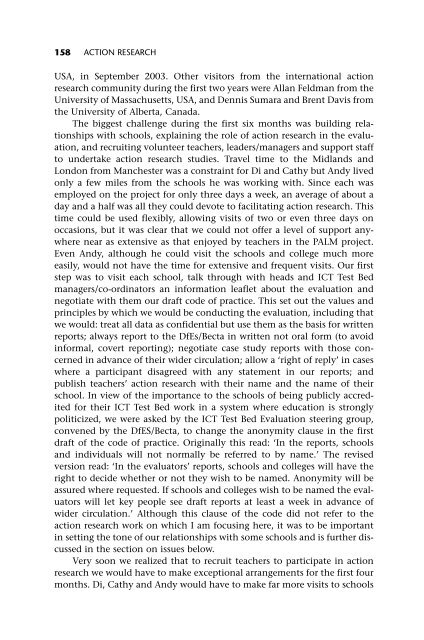Action Research A Methodology for Change and Development
Action Research A Methodology for Change and Development
Action Research A Methodology for Change and Development
You also want an ePaper? Increase the reach of your titles
YUMPU automatically turns print PDFs into web optimized ePapers that Google loves.
158 ACTION RESEARCH<br />
USA, in September 2003. Other visitors from the international action<br />
research community during the first two years were Allan Feldman from the<br />
University of Massachusetts, USA, <strong>and</strong> Dennis Sumara <strong>and</strong> Brent Davis from<br />
the University of Alberta, Canada.<br />
The biggest challenge during the first six months was building relationships<br />
with schools, explaining the role of action research in the evaluation,<br />
<strong>and</strong> recruiting volunteer teachers, leaders/managers <strong>and</strong> support staff<br />
to undertake action research studies. Travel time to the Midl<strong>and</strong>s <strong>and</strong><br />
London from Manchester was a constraint <strong>for</strong> Di <strong>and</strong> Cathy but Andy lived<br />
only a few miles from the schools he was working with. Since each was<br />
employed on the project <strong>for</strong> only three days a week, an average of about a<br />
day <strong>and</strong> a half was all they could devote to facilitating action research. This<br />
time could be used flexibly, allowing visits of two or even three days on<br />
occasions, but it was clear that we could not offer a level of support anywhere<br />
near as extensive as that enjoyed by teachers in the PALM project.<br />
Even Andy, although he could visit the schools <strong>and</strong> college much more<br />
easily, would not have the time <strong>for</strong> extensive <strong>and</strong> frequent visits. Our first<br />
step was to visit each school, talk through with heads <strong>and</strong> ICT Test Bed<br />
managers/co-ordinators an in<strong>for</strong>mation leaflet about the evaluation <strong>and</strong><br />
negotiate with them our draft code of practice. This set out the values <strong>and</strong><br />
principles by which we would be conducting the evaluation, including that<br />
we would: treat all data as confidential but use them as the basis <strong>for</strong> written<br />
reports; always report to the DfEs/Becta in written not oral <strong>for</strong>m (to avoid<br />
in<strong>for</strong>mal, covert reporting); negotiate case study reports with those concerned<br />
in advance of their wider circulation; allow a ‘right of reply’ in cases<br />
where a participant disagreed with any statement in our reports; <strong>and</strong><br />
publish teachers’ action research with their name <strong>and</strong> the name of their<br />
school. In view of the importance to the schools of being publicly accredited<br />
<strong>for</strong> their ICT Test Bed work in a system where education is strongly<br />
politicized, we were asked by the ICT Test Bed Evaluation steering group,<br />
convened by the DfES/Becta, to change the anonymity clause in the first<br />
draft of the code of practice. Originally this read: ‘In the reports, schools<br />
<strong>and</strong> individuals will not normally be referred to by name.’ The revised<br />
version read: ‘In the evaluators’ reports, schools <strong>and</strong> colleges will have the<br />
right to decide whether or not they wish to be named. Anonymity will be<br />
assured where requested. If schools <strong>and</strong> colleges wish to be named the evaluators<br />
will let key people see draft reports at least a week in advance of<br />
wider circulation.’ Although this clause of the code did not refer to the<br />
action research work on which I am focusing here, it was to be important<br />
in setting the tone of our relationships with some schools <strong>and</strong> is further discussed<br />
in the section on issues below.<br />
Very soon we realized that to recruit teachers to participate in action<br />
research we would have to make exceptional arrangements <strong>for</strong> the first four<br />
months. Di, Cathy <strong>and</strong> Andy would have to make far more visits to schools

















